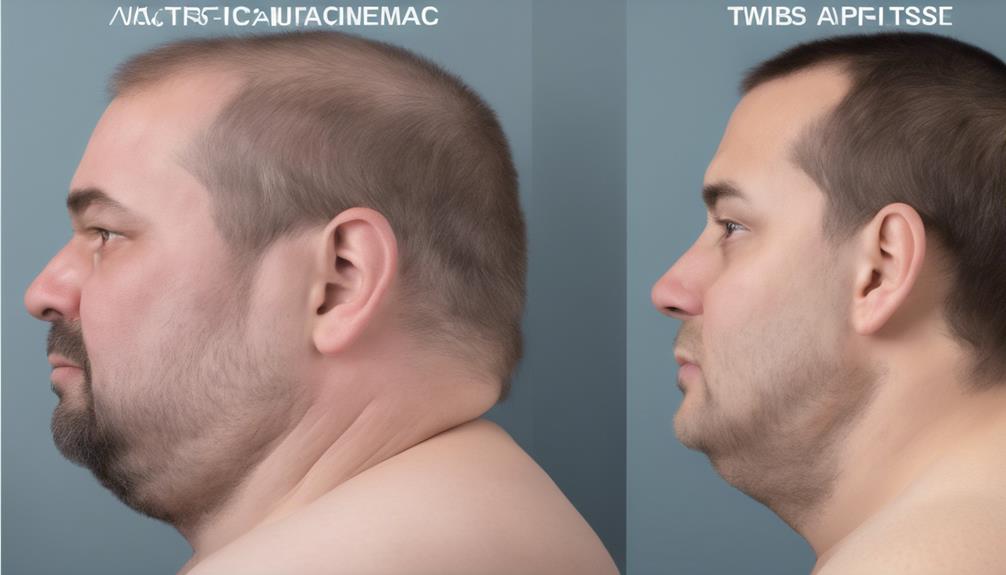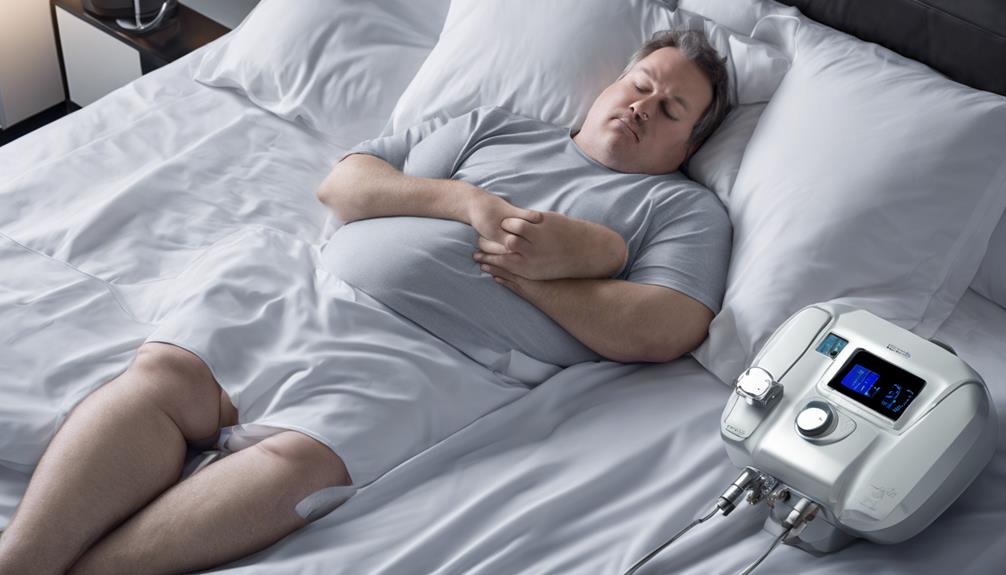Losing weight can help improve sleep apnea by reducing symptoms. Excess weight can block airways, worsening apnea. Shedding 10-15% of body weight can cut apnea severity by half in obese people. Weight loss targets fat in the throat and other areas to clear airways. It lessens the need for continuous positive airway pressure (CPAP) therapy. Weight loss lowers apnea severity to a notable extent. Better outcomes are seen after losing 10% of body weight. Physical activity and diet changes aid in weight loss. Healthcare providers can plan personalized weight loss programs. Consistent weight loss progress is key for effective apnea management.
Key Takeaways
- Losing 10-15% of body weight can reduce OSA severity by up to 50%.
- Weight loss targets tongue fat and airway blockages, improving OSA symptoms.
- Effective weight loss strategies lead to better outcomes in managing OSA.
- Weight loss may decrease the need for continuous positive airway pressure (CPAP) therapy.
- Aggressive weight loss programs can benefit obese OSA patients more than CPAP therapy.
Impact of Weight Loss on Sleep Apnea
When discussing the impact of weight loss on sleep apnea, it becomes evident that shedding excess pounds plays an important role in improving obstructive sleep apnea (OSA) symptoms. Excess weight can lead to the accumulation of fat in various areas of the body, including the tongue. In the upper airway anatomy, excess fat in the tongue can contribute to airway blockages during sleep, leading to breathing difficulties and pauses characteristic of OSA. However, through weight loss, particularly a reduction in tongue fat volume, the severity of OSA can be greatly reduced.
Research indicates that losing 10-15% of body weight can decrease OSA severity by up to 50% in obese individuals. By targeting tongue fat and other areas like the pterygoid and pharyngeal lateral wall volumes, weight loss can alleviate airway blockages, thus improving sleep apnea. This improvement is notable as it reduces the reliance on continuous positive airway pressure (CPAP) therapy, offering a more natural and sustainable approach to managing OSA.
Therefore, understanding the effect of weight loss on sleep apnea is important for improving overall sleep quality and health.
Weight Loss and OSA Improvement

Losing weight has been shown to greatly improve obstructive sleep apnea (OSA) symptoms and can even cure the condition in many patients. This is because excess body weight can lead to the narrowing of the airway during sleep, contributing to OSA.
Here are some key points to take into account regarding weight loss and OSA improvement:
- Weight loss is linked to significant reductions in OSA severity.
- The American Academy of Sleep Medicine recommends retesting OSA patients after a 10% body weight loss.
- Effective weight loss strategies can lead to better outcomes for OSA management.
Weight Loss Strategies for OSA
Effective weight management plays an important role in improving obstructive sleep apnea (OSA) symptoms and overall health outcomes. For individuals starting sleep apnea, especially obese patients, losing 10-15% of body weight can greatly reduce OSA severity by up to 50%. To achieve weight loss, consider behavioral changes, dietary adjustments, and increased physical activity as effective methods. These strategies not only help manage OSA but also improve symptoms like daytime sleepiness and irritability. Additionally, shedding excess weight can enhance cardiovascular health and overall quality of life.
It is crucial to consult a healthcare provider when initiating a weight loss journey, especially in the context of OSA. Healthcare providers can tailor weight loss programs to individual needs, considering the severity of OSA and personal health goals. By integrating weight loss programs into OSA management plans, individuals can experience sustained improvements in symptoms and general well-being. Remember, gradual and steady progress in weight loss is key to long-term success in managing OSA effectively.
Weight Loss and Comorbidities Management

Weight loss plays an important role in managing obstructive sleep apnea (OSA) and its associated comorbidities. When addressing OSA and its related complications through weight loss, we tackle a significant root cause and reduce health risks. Here are some key points to take into account:
- Obesity and OSA: Obesity is a major risk factor for cardiovascular disease, hypertension, stroke, and mortality in individuals with OSA.
- Medical Guidance: The American Academy of Sleep Medicine recommends retesting OSA patients after a 10% body weight loss to assess improvements in sleep apnea symptoms.
- Aggressive Weight Loss: Aggressive weight loss programs may be more beneficial than CPAP therapy in managing OSA and its comorbidities, emphasizing the importance of sustainable weight management for overall health.
Weight Loss Vs. CPAP for OSA
In managing obstructive sleep apnea (OSA), the comparison between weight loss and CPAP therapy reveals notable considerations for treatment efficacy. For some obese OSA patients, a 10% body weight loss can lead to significant improvements in their condition. The American Academy of Sleep Medicine recommends retesting OSA patients after this weight loss milestone to assess the need for CPAP assistance.
In some cases, CPAP therapy may not be necessary after substantial weight loss. Additionally, aggressive weight loss programs could provide more benefits than relying solely on CPAP for symptomatic relief. For obese OSA patients who struggle to lose weight through traditional methods, bariatric surgery might be considered as part of a thorough weight loss plan.
Individuals with OSA should discuss with their healthcare providers the options of weight loss, CPAP therapy, and bariatric surgery to determine the most effective treatment plan for their specific situation.
Frequently Asked Questions
How Much Weight Loss Cures Sleep Apnea?
Shedding weight noticeably can cure sleep apnea in many cases. It's suggested to retest after a 10% body weight loss. Aggressive weight reduction programs are often more effective than CPAP. In some instances, CPAP may not be needed post-weight loss.
How I Cured My Sleep Apnea?
We cured our sleep apnea by making lifestyle changes. Our journey involved weight loss, better sleep hygiene, and consistent use of a CPAP machine. Consult with healthcare providers for guidance on personal solutions to improve sleep quality. These efforts not only improved our sleep but also boosted our overall health and energy levels. For those exploring additional options, it’s worth learning how Inspire therapy works—a revolutionary treatment that uses gentle nerve stimulation to support healthy breathing during sleep. Remember, everyone’s path to better rest is unique, so stay informed and persistent in finding what works best for you.
What Is Life Expectancy With Sleep Apnea?
Improperly managed sleep apnea can reduce life expectancy by up to 20 years. Untreated severe cases elevate cardiovascular risks and mortality rates. Effective treatment can enhance life expectancy and reduce associated health dangers, underlining the importance of proper care.
Can Sleep Apnea Be Cured With Lifestyle Changes?
We believe in the power of lifestyle changes to positively impact sleep apnea. Through dedication and healthy choices, many have found relief. Let's aim for better sleep and improved well-being together.
Conclusion
To sum up, shedding excess weight can act as a key to open the door to better sleep for those with sleep apnea.
Just like a heavy fog lifting to reveal a clear, starry night sky, losing weight can help improve breathing during sleep and reduce the symptoms of sleep apnea.
By following weight loss strategies and managing comorbidities, individuals can work towards a healthier future and potentially reduce their reliance on CPAP machines.









